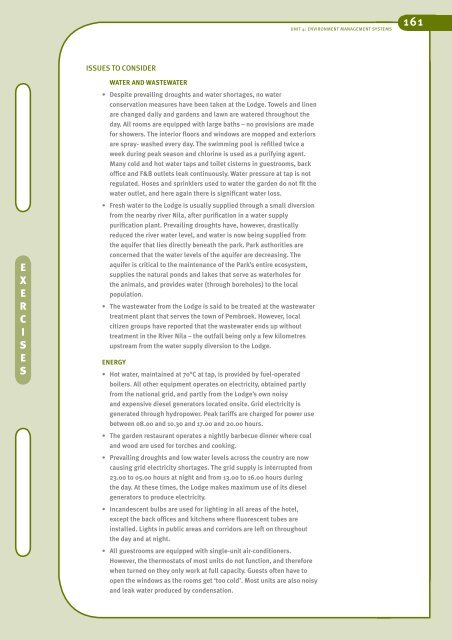Online version: PDF - DTIE
Online version: PDF - DTIE
Online version: PDF - DTIE
You also want an ePaper? Increase the reach of your titles
YUMPU automatically turns print PDFs into web optimized ePapers that Google loves.
UNIT 4: ENVIRONMENT MANAGEMENT SYSTEMS<br />
161<br />
ISSUES TO CONSIDER<br />
E<br />
X<br />
E<br />
R<br />
C<br />
I<br />
S<br />
E<br />
S<br />
WATER AND WASTEWATER<br />
• Despite prevailing droughts and water shortages, no water<br />
conservation measures have been taken at the Lodge. Towels and linen<br />
are changed daily and gardens and lawn are watered throughout the<br />
day. All rooms are equipped with large baths – no provisions are made<br />
for showers. The interior floors and windows are mopped and exteriors<br />
are spray- washed every day. The swimming pool is refilled twice a<br />
week during peak season and chlorine is used as a purifying agent.<br />
Many cold and hot water taps and toilet cisterns in guestrooms, back<br />
office and F&B outlets leak continuously. Water pressure at tap is not<br />
regulated. Hoses and sprinklers used to water the garden do not fit the<br />
water outlet, and here again there is significant water loss.<br />
• Fresh water to the Lodge is usually supplied through a small di<strong>version</strong><br />
from the nearby river Nila, after purification in a water supply<br />
purification plant. Prevailing droughts have, however, drastically<br />
reduced the river water level, and water is now being supplied from<br />
the aquifer that lies directly beneath the park. Park authorities are<br />
concerned that the water levels of the aquifer are decreasing. The<br />
aquifer is critical to the maintenance of the Park’s entire ecosystem,<br />
supplies the natural ponds and lakes that serve as waterholes for<br />
the animals, and provides water (through boreholes) to the local<br />
population.<br />
• The wastewater from the Lodge is said to be treated at the wastewater<br />
treatment plant that serves the town of Pembroek. However, local<br />
citizen groups have reported that the wastewater ends up without<br />
treatment in the River Nila – the outfall being only a few kilometres<br />
upstream from the water supply di<strong>version</strong> to the Lodge.<br />
ENERGY<br />
• Hot water, maintained at 70°C at tap, is provided by fuel-operated<br />
boilers. All other equipment operates on electricity, obtained partly<br />
from the national grid, and partly from the Lodge’s own noisy<br />
and expensive diesel generators located onsite. Grid electricity is<br />
generated through hydropower. Peak tariffs are charged for power use<br />
between 08.00 and 10.30 and 17.00 and 20.00 hours.<br />
• The garden restaurant operates a nightly barbecue dinner where coal<br />
and wood are used for torches and cooking.<br />
• Prevailing droughts and low water levels across the country are now<br />
causing grid electricity shortages. The grid supply is interrupted from<br />
23.00 to 05.00 hours at night and from 13.00 to 16.00 hours during<br />
the day. At these times, the Lodge makes maximum use of its diesel<br />
generators to produce electricity.<br />
• Incandescent bulbs are used for lighting in all areas of the hotel,<br />
except the back offices and kitchens where fluorescent tubes are<br />
installed. Lights in public areas and corridors are left on throughout<br />
the day and at night.<br />
• All guestrooms are equipped with single-unit air-conditioners.<br />
However, the thermostats of most units do not function, and therefore<br />
when turned on they only work at full capacity. Guests often have to<br />
open the windows as the rooms get ‘too cold’. Most units are also noisy<br />
and leak water produced by condensation.
















